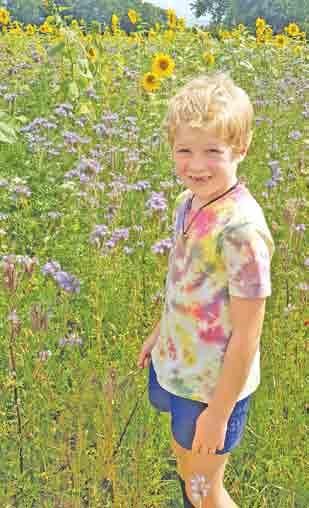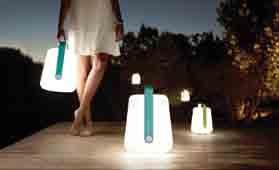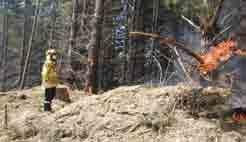
3 minute read
1
News 6 WEDNESDAY 5 February 2020 Colourful crop rotation proves popular
use, to pack around the base of the fruit trees to reduce moisture loss and also for packing the trees during shipping,”Dan says. Waimea Nurseries grow trees which are sold to orchards and garden centres nationwide. They are grown for one to two years, and dug up in winter. The sunflowers, along with crimson clover, vetch and others, produce flowers and provide a habitat and pollen for beneficial insects like parasitic wasps which kill insects like caterpillars and aphids that damage the trees, reducing the need for insecticide sprays. Dan explains that plants like mustard, with its bright yellow flower, are sown for its natural fumigation of soil pathogens. Other plants such as blue lupins are nitrogen-fixing plants which take nitrogen from the air and transfer it into the ground. “Essentially, putting back what we take out,” says Dave Harris, container nursery manager. “We might plant a deep-rooting species which grow a deep tap root, and we cut them off at the top and the tap root rots down and leaves a pathway for drainage,” says Dave. Dave says that one of the benefits of the planting is that they can reduce the chemicals they use. “No chemicals are used and if you increase the organic matter in the soil you increase its ability to hold more water.” But it wasn’t just crowds of locals and holidaymakers that found the sunflowers irresistible. The nurseries had a call from a nearby beekeeper, who was having trouble tracking down swarms of his bees that had been disappearing. After he traced them to the Waimea Nurseries sunflower field, he was very keen to know what field they would be in next year as he intended to place his hives as close to that paddock as he could. Harry Marshall, age 6, of Belgrove, in Waimea Nurseries’ block of sunflowers. The flowers are grown then ploughed back into the soil to replace vital nutrients. Photo: Supplied.
Advertisement


SUMMER SELLOUT
Forestry plantation areas closed as temperatures soar
Jacob Page
The Tasman District Council has closed access to forestry plantation areas at Kingsland Forest, Moturoa/ Rabbit Island, Rough Island and Tunnicliff Forest due to high temperatures. With continued hot dry weather, and after seeking advice from Fire and Emergency New Zealand, the decision was made with public safety in mind. The closures affect the forestry plantations in the reserves only, at this time. Access to the beach, picnic areas and equestrian park at Moturoa/ Rabbit Island and Rough Island remains open for now. The decision to close access is made to protect public safety as the BUI (Build Up Index)* is now above 80. A key factor in deciding to close these areas is the risk of anyone in the reserves being overrun by fire before they can escape. Fire travels exponentially faster on uphill slopes than it does on flat ground and forest areas burn more intensely. Signage will be in place at all the closed areas so please take note and stay out for your own safety. The lower reserve areas below Kingsland Forest (Easby Park and Dellside) remain open for now, but people are advised to visit the reserves early in the morning or in the evening, when the fire risk is lower. The Great Taste Trail coastal access route at Moturoa/Rabbit Island also remains open at this time. The Tasman District Council will assess the situation weekly and further closures may be needed if weather conditions remain the same.

Firefighters battle last Februar y’s blaze in Pigeon Valley. Photo: Supplied.
Buy your tickets online now! www.nwff.co.nz News

$1,000 WIN BE IN TO 1 TO BE WON IN EVERY STORE WHEN YOU PURCHASE ANY OF THE SELECTED PARTICIPATING PRODUCTS Prezzy Card

SEE INSTORE FOR DETAILS

www.foursquare.co.nz
facebook.com/FourSquareNZ






